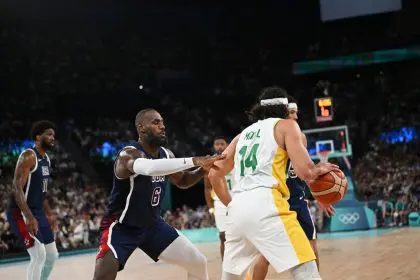The world of competitive athletics witnessed a heated social media confrontation recently when Olympic gymnastics legend Simone Biles directly challenged former collegiate swimmer Riley Gaines over her stance against transgender athletes participating in women’s sports. The exchange, which unfolded on X (formerly Twitter), has amplified an already contentious national debate about fairness, inclusion and the future of competitive sports.
The dispute erupted after Gaines criticized a Minnesota high school girls’ softball team celebrating their state championship victory. The team included a transgender athlete, prompting Gaines to question their decision to disable comments on their celebratory social media posts. Gaines suggested the team was attempting to avoid criticism by preventing public discourse on their achievement.
Biles takes direct action
Rather than remaining silent on the controversy, Biles chose to confront Gaines head-on with characteristic directness. The seven-time Olympic medalist accused Gaines of harboring personal resentment following her own competitive disappointment, when she tied for fifth place with transgender swimmer Lia Thomas at the NCAA Championships.
@Riley_Gaines_ You’re truly sick, all of this campaigning because you lost a race. Straight up sore loser. You should be uplifting the trans community and perhaps finding a way to make sports inclusive OR creating a new avenue where trans feel safe in sports. Maybe a transgender… https://t.co/pjpzuZ0AlO
— Simone Biles (@Simone_Biles) June 6, 2025
Biles declared that Gaines was truly sick and accused her of campaigning against transgender athletes simply because she lost a race, calling her a straight-up sore loser. The message struck at what many perceive as the underlying motivation behind Gaines’ activism against transgender participation in women’s sports.
The gymnastics champion didn’t stop there. She proposed what she considered a constructive solution while simultaneously criticizing Gaines’ approach to the issue. Biles suggested creating separate competitive categories specifically for transgender athletes across all sports, arguing this could provide opportunities without the current controversy.
Biles further stated that perhaps there should be a transgender category in all sports, but instead of pursuing constructive solutions, Gaines chooses to bully transgender athletes. She emphasized her belief that no one in sports is safe with Gaines around, highlighting her view that Gaines’ methods were harmful rather than helpful.
The Thomas-Gaines controversy background
The tension between these perspectives traces back to the NCAA Division I Women’s Swimming and Diving Championships, where University of Pennsylvania swimmer Lia Thomas became the first transgender woman to win a national collegiate swimming championship. Thomas’ participation generated significant controversy, particularly after she tied with Gaines in the freestyle preliminary races.
Following widespread criticism and debate, World Aquatics, the sport’s international governing body, implemented new regulations prohibiting transgender women who experienced male puberty from competing in women’s elite competitions. The decision reflected growing pressure from various stakeholders concerned about competitive balance and fairness.
Gaines has since become a prominent voice opposing transgender participation in women’s sports, frequently speaking at events and using social media platforms to advocate for what she describes as protecting women’s athletics. Her critics, including Biles, argue that such positions contribute to discrimination and exclusion of vulnerable individuals.
Biles advocates for different approach
The Olympic champion’s intervention represents a different philosophical approach to addressing transgender participation in sports. Rather than seeking to exclude transgender athletes entirely, Biles has suggested creating additional competitive pathways that could accommodate everyone while addressing concerns about fairness.
This perspective aligns with growing calls from some quarters for more nuanced solutions to what has become one of the most divisive issues in contemporary sports. Advocates for transgender inclusion argue that sports should serve as platforms for empowerment and community building, not exclusion and discrimination.
The debate reflects broader societal tensions about transgender rights, particularly as they intersect with traditional competitive structures that have historically separated participants based on biological sex assigned at birth. Sports organizations worldwide continue grappling with policies that balance inclusion with competitive integrity.
Impact on young athletes
The Minnesota softball team at the center of this latest controversy represents thousands of young athletes navigating these complex dynamics. High school sports participation continues growing among transgender youth, creating practical challenges for administrators, coaches and families seeking to balance inclusion with existing competitive frameworks.
Educational institutions increasingly find themselves at the center of these debates, with some states implementing legislation restricting transgender participation while others pursue more inclusive policies. The patchwork of different approaches creates uncertainty for athletes and families across the country.
Biles legacy and influence
Simone Biles‘ decision to enter this debate carries significant weight given her status as one of the most accomplished and respected athletes in American sports history. Her advocacy for mental health awareness and athlete welfare has already established her as a voice extending beyond gymnastics competition.
The gymnast’s approach emphasizes constructive solutions rather than exclusionary policies, suggesting ways to expand opportunities rather than restrict them. This philosophy reflects her broader commitment to using her platform for positive social change and supporting marginalized communities.
Moving beyond division
As this debate continues evolving, the exchange between Biles and Gaines illustrates the stark differences in approach among those seeking to address transgender participation in sports. While some advocate for restrictions based on concerns about competitive fairness, others push for creative solutions that expand rather than limit opportunities.
The sports community faces ongoing pressure to develop policies that acknowledge the legitimate concerns of all stakeholders while protecting the rights and dignity of transgender athletes. Finding common ground requires moving beyond personal grievances toward collaborative problem-solving that serves everyone’s interests.
The conversation sparked by Biles‘ intervention demonstrates that these issues will continue generating passionate responses from athletes, advocates and observers alike. The ultimate resolution will likely require the kind of thoughtful, inclusive approach that Biles herself has advocated – one that seeks to build bridges rather than walls in the world of competitive athletics.














